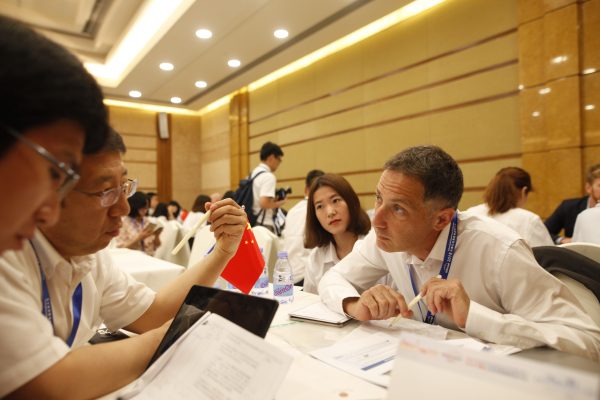Science and technology (S&T) cooperation has always been a central part of China–Israel relations. That includes defence technology transfers, but also collaborations in purely civilian areas. Recently, China has shown interest in emerging technologies being developed in Israel, such as artificial intelligence, nanotechnology and autonomous vehicles technology. Aspiring to pave new ways to Beijing after Israel unilaterally cut off its defence relations with China in the early 2000s, Israel is enthusiastic. In 2017, their relations were framed as an Innovative Comprehensive Partnership, demonstrating the central place of S&T cooperation in their relations.
This cooperation has developed rapidly and includes investment in and acquisition of Israeli high-tech companies by Chinese firms, joint commercial research and development (R&D) programs and academic cooperation. The governmental framework for this cooperation is the Israel–China Joint Committee for Innovation Cooperation, which was established in 2015.
Israel may be enthusiastic about China, but it is unwilling to antagonise the United States. Israel strictly follows its mid-2000s understanding with the United States, according to which S&T cooperation with China involves civilian know-how only. Still the United States feels uneasy about Israel–China S&T cooperation. It makes decisive yet obscure demands for Israel to tighten the monitoring of these activities and to restrain them.
But a close look at China’s investments in Israel provides a complex picture — Chinese direct investments in Israel’s high-tech industry are relatively small and sporadic. Over 90 per cent of China’s US$9.5 billion direct investment into Israel as of late 2018 was comprised of the acquisitions of only three companies, of which only one is a high-tech company. The rest of its investments in technology are limited to a few hundred million US dollars each year. Other Chinese investments in Israel are made through capital venture funds, providing investors with very limited access to know-how.
Overall, by mid-2018 Chinese investments in Israel constituted just 4 per cent of Israel’s foreign direct investments (FDI), compared to the United States with a share of 35 per cent. Considering the limited flow of Chinese FDI to Israel (around US$100 million in 2018 out of the total US$21.8 billion), China is far from gaining a foothold in Israel’s high-tech sector.
Neither the scale of China’s presence in Israel’s high-tech sector nor Israel’s defence technology exports to China justify US concerns over Israel–China S&T cooperation. There are three other reasons that might be responsible for these US concerns.
First, Israel’s high-tech sector has strong connections with the defence establishment. Many high-tech companies are established by veterans of military technological units, others are financially supported by the Ministry of Defence and a relatively large share of them are suppliers of the defence establishment. Even when Israeli high-tech products are categorised as civilian, many of them are still defence oriented.
Second, while Israel strictly bans defence and dual-use exports to China, the United States suspects that Israel’s monitoring of FDI and the involvement of Chinese firms in infrastructure projects — a growing source of US concern — is relatively weak. Given Israel’s past defence relations with China, it is plausible that Washington doubts whether Israel shares its concerns over China and incorporates concerns adequately into its investment monitoring process.
Finally, S&T cooperation with Israel allows China to get closer to an important US partner, exposing the US failure to keep its allies and partners out of China’s reach. After the US forced Israel in the early 2000s to cut off defence relations with China, China kept distance from Israel for about a decade. But by the early 2010s, when China openly started to search for a world power position, did China thaw relations with Israel.
By the mid-2010s, when traditional US allies started joining Chinese global initiatives despite Washington’s objections, Washington became concerned about China’s relationships with US allies. Bridging its differences with Israel and getting access to its sensitive sectors may seem like another Chinese achievement against US attempts to block its economic and diplomatic expansion.
The United States has failed to concretely elucidate its concerns and expectations to Israel on time, to suggest clear policy guidelines or to point to acceptable alternatives to projects and services currently supplied by Chinese firms. While Israeli observers call attention to this, US pressure on Israel is unlikely to decline. The United States is experiencing similar challenges with other allies, who just like Israel, cannot turn their back to China despite their close relationship with the United States.
Considering Israel’s intimate defence relationship with the United States, it is unlikely that the United States will allow Israel–China S&T cooperation to continue uninterrupted. Indeed, in late October Israel announced the formation of a panel to monitor foreign investments. But as China currently has greater leverage on Israel than it did in the early 2000s and is less willing to be pushed aside by the United States, US pressure on Israel to reduce cooperation with China is expected to face a Chinese response. Navigating between Washington and Beijing is becoming ever more complex and costly for Israel.
Yoram Evron is a senior lecturer of China studies in the Department of Asia Studies, the University of Haifa, Israel.

